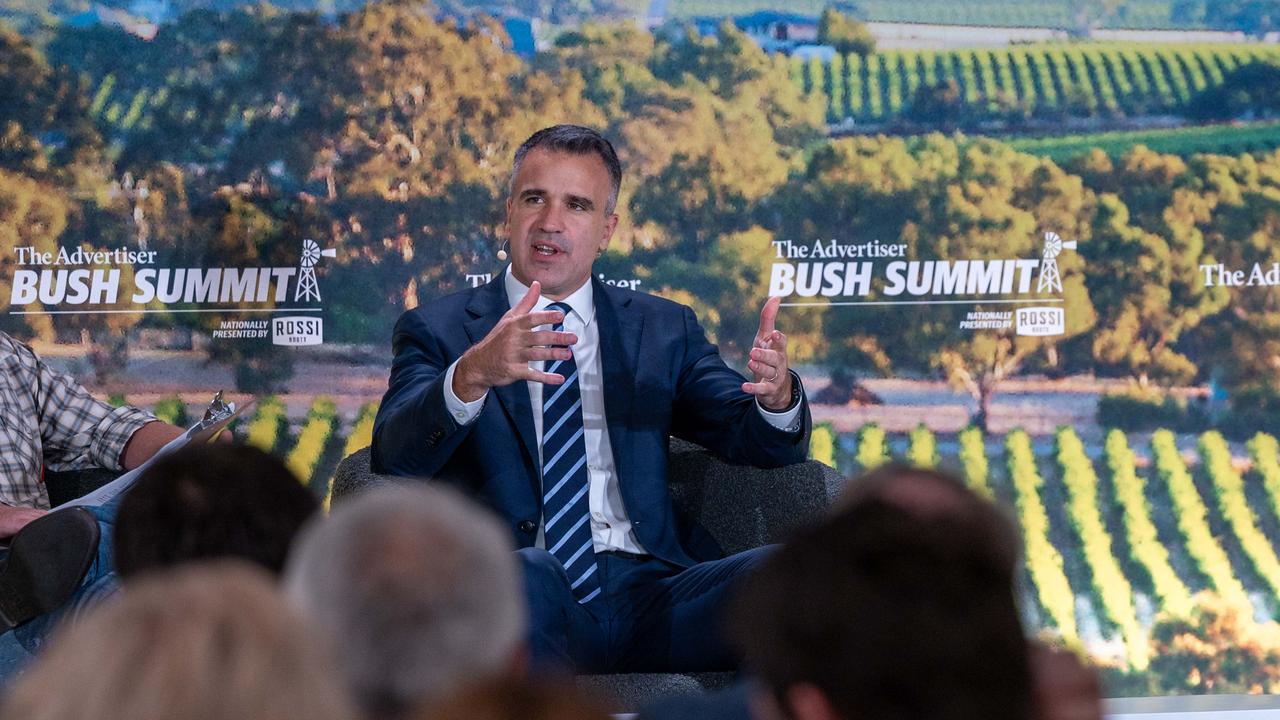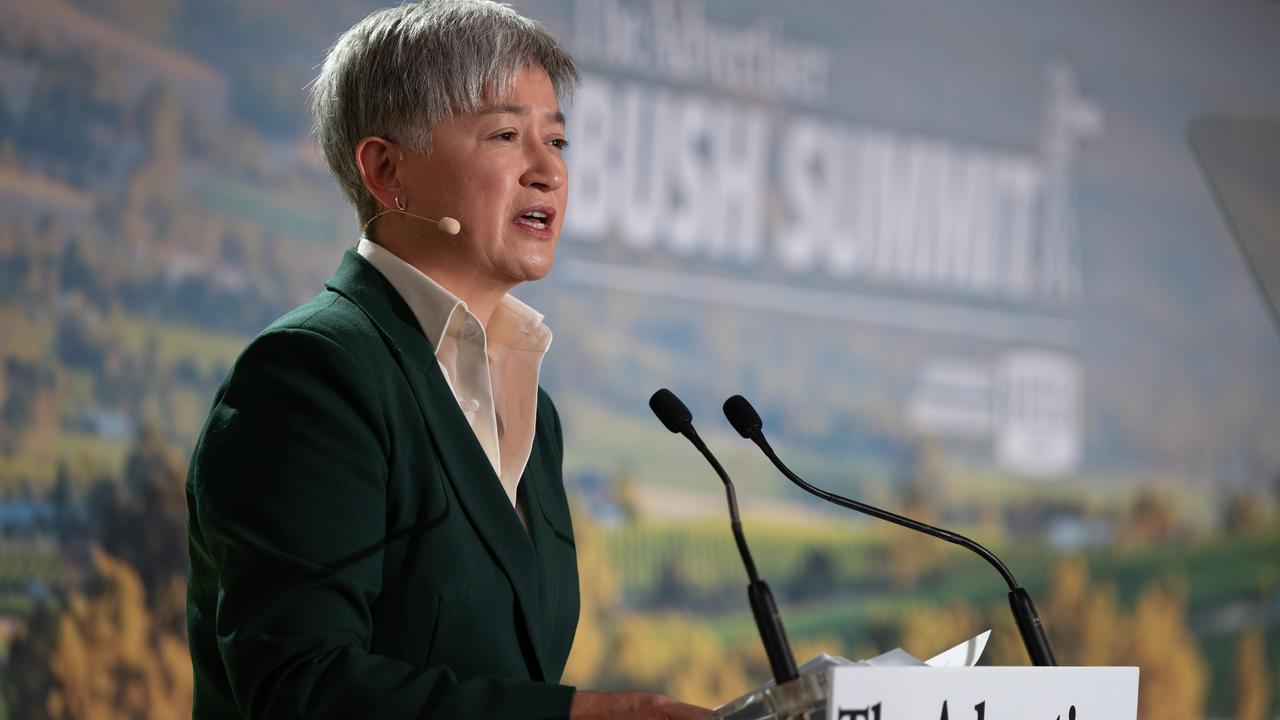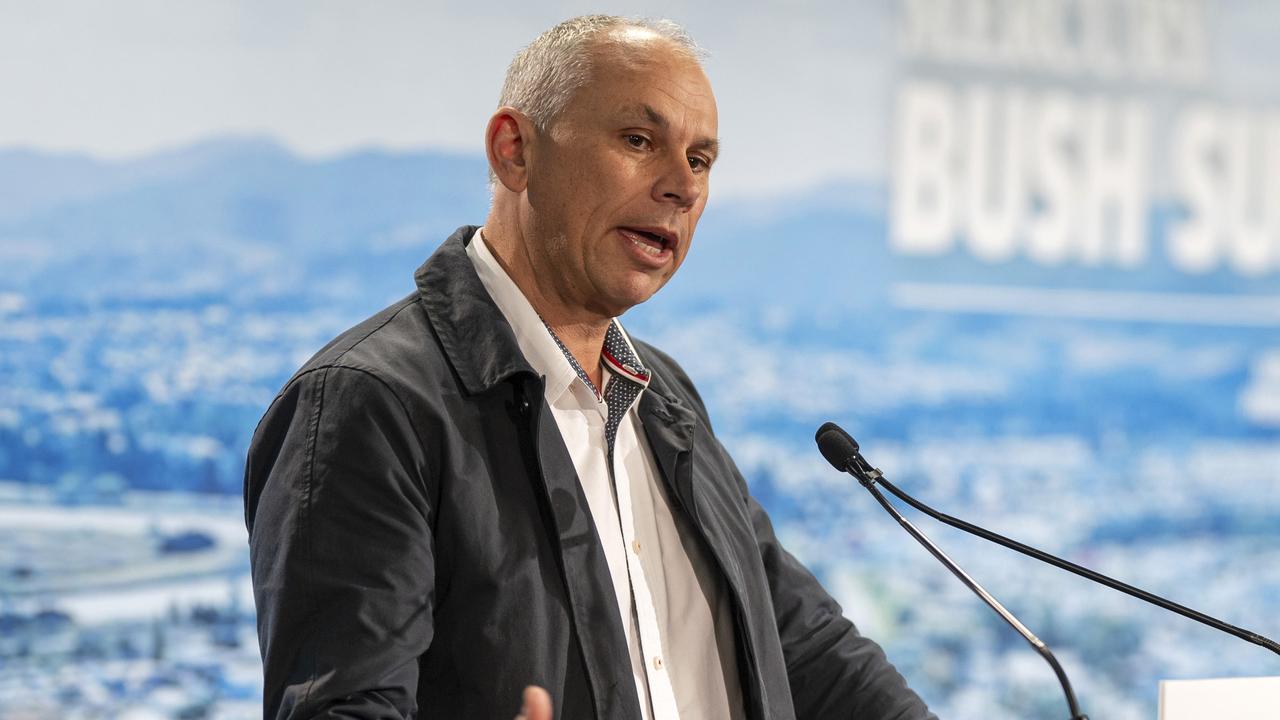Premier Peter Malinauskas brands electricity costs ‘a real public policy disaster’
The explosion in power bills was the result of a “real public policy disaster”, Premier Peter Malinauskas told The Advertiser’s Bush Summit on Wednesday.
SA News
Don't miss out on the headlines from SA News. Followed categories will be added to My News.
Premier Peter Malinauskas has branded the nation’s electricity system “a real public policy disaster” as he declared state leaders should not “shirk responsibility” for soaring prices crippling households and businesses.
Speaking at The Advertiser’s Bush Summit on Wednesday, Mr Malinauskas condemned electricity “policy paralysis and partisanship” for driving up prices and deterring investment in new generators.
Asked whether he was nagging his family to turn off lights to save electricity, Mr Malinauskas confessed he “gave one of the kids a bit of a spray the other day” and thought: “I’m becoming like my father” in his bid to save costs.
Speakers at the Bush Summit, at McLaren Vale, pleaded for government action to bring relief from crippling costs, including energy and fuel, following The Advertiser on Tuesday revealing iconic South Australian firm Nippy’s monthly electricity bill had more than doubled in a year to $109,580.10.

Mr Malinauskas also branded as “a social tragedy” the severe skilled worker shortages in regional SA, saying it was “mission-critical” to fulfil the state’s economic ambitions to have “human capital living in our regions”.
Asked if it was impossible for a state leader to reduce power prices, Mr Malinauskas said: “I don’t think premiers should shirk responsibility – I absolutely think we’ve got a role to play.”
But he said state policy levers were limited in comparison to the federal government’s, lamenting a longstanding lack of “a coherent degree of bipartisanship and policy certainty” at a national level.
“If you ask me, I think that the creation of the National Electricity Market (in 1998), combined with the privatisation of the electricity market, has been a real public policy disaster,” Mr Malinauskas said.
“ … The nonsense of the climate wars at a federal level has undermined investment and, unfortunately, it looks like it’s continuing today.
“That, in turn, is resulting in an energy-rich country that exports power to the rest of the world paying a higher domestic power price than the very countries that we are exporting our own energy to – and if that is not the best example of policy failure, then I’m not too sure what is.”
An Advertiser poll in 2016 found simmering public anger at the 1999 privatisation of state-owned electricity utility ETSA was the major source of public blame for soaring power prices
In a separate Bush Summit interview, Foreign Affairs Minister Penny Wong dismissed the Coalition’s nuclear plan as uneconomic, saying it would cost $600bn to deliver four per cent of Australia’s power by 2035.
The prominent Labor Left figure insisted her opposition to nuclear was on economic grounds alone, saying this had been confirmed by analysis she commissioned as Climate Change Minister in the Rudd government.

Senator Wong insisted gas would continue to have a role, just as continued renewable energy investment was essential.
“Gas has a place. We need gas for firming for renewables. We need gas in industrial processes and gas will be retained or continue to be part of people’s domestic consumption in their homes,” she said.
Delivering a keynote address to the Bush Summit, Mr Malinauskas said the state’s regional towns were increasingly supporting well-paid, highly skilled jobs, coupled with an enviable standard of living with which Australian capitals struggled to compete.
“The more we can make that appealing balance of career and lifestyle possible for towns all around the state, the better – because right now there is far more regional demand for labour than there is supply,” he said.
“I honestly believe that this unmet economic potential is more than just a policy failure – it is a social tragedy. If we want our regions to fulfil the state’s economic aspirations, then human capital living in our regions is mission-critical.”
Mr Malinauskas said governments had a vital role to play in tackling the biggest pressure points for people considering moving to the regions, listing access to education, access to healthcare and housing accessibility.
“History tells us that people will move to where services are, and that they will move away from where services are not. It’s that simple.
We know that many regional centres are struggling to find enough accommodation for the doctors and nurses and teachers and police officers that are so vital to any community,” he said.
The Premier listed numerous state government projects aimed at tackling this, including a pilot program to build rental housing for workers, a country teacher loading allowance and hospital upgrades across the state.
“The headline is that my government is determined to use every tool at our disposal to help regional South Australia enjoy a greater standard of living and greater prosperity – with more opportunity and more reward for ambition,” he said.
“And we are doing this not just because it makes economic sense, which it does, or because it is the responsible thing to do, which it is. It is also because it is fundamental to who we are as South Australians.”

RED TAPE HURTING SA FARMERS : GILES
Red tape and bureaucracy is paralysing farmers who are spending too much time in front of computers doing paperwork after long days in paddocks, says the head of one of the nation’s biggest pastoral firms.
Hancock Agriculture chief Adam Giles attacked the size of the federal bureaucracy, saying 106,000 public servants were working on regulation – a 17 per cent rise in one year.
Speaking at The Advertiser Bush Summit on Wednesday, Mr Giles said the red tape overload was affecting farmers’ mental health by diverting them from feeding sheep, cropping and other tasks.
“You go out in the morning, you feed out your hay, whatever your operation is... you do what you do. Then you come back and then you’re doing your BAS forms, then you’re doing your water use forms and then you’re doing every single thing you’ve got to do … it’s bloody hard work,” he said.
“The more regulation that you keep putting on this, it’s going to make it harder for us to do operations … we don’t want to sit in front of a computer and do paperwork all day.”
Mr Giles, also the chief of iconic pastoral firm S. Kidman & Co and a former Northern Territory chief minister, said the red tape burden was intensifying the difficulty of competing against farm operations overseas that were government subsidised,such as in the United States, China and the European Union.
“I’m not one for subsidising farmers but we’re competing in an international market against subsidised countries and (red tape is added) instead of making life easier for us as we innovate and we become smarter technologically, so we can farm better and get better practices,” Mr Giles said.
He listed burdens including the right of union delegates to enter family businesses with 15 staff and superannuation changes on unrealised capital gains affecting 80,000 family farms.
“With all of these things that are going on it’s no wonder people are having mental health and family relationship challenges and all of these things, because all people really want to do is grow food to feed Australia and feed other people around the world,” Mr Giles said.
Mr Giles said farmers believed they were undervalued by the Australian public, even though Institute of Public Affairs research showed 80 per cent of people highly valued their efforts.
“So you’ve got farmers going: ‘We love our job, we do all this work but no one loves us” and then the IPA going: ‘Well, actually, everyone does love you’,” he said
More Coverage
Originally published as Premier Peter Malinauskas brands electricity costs ‘a real public policy disaster’









